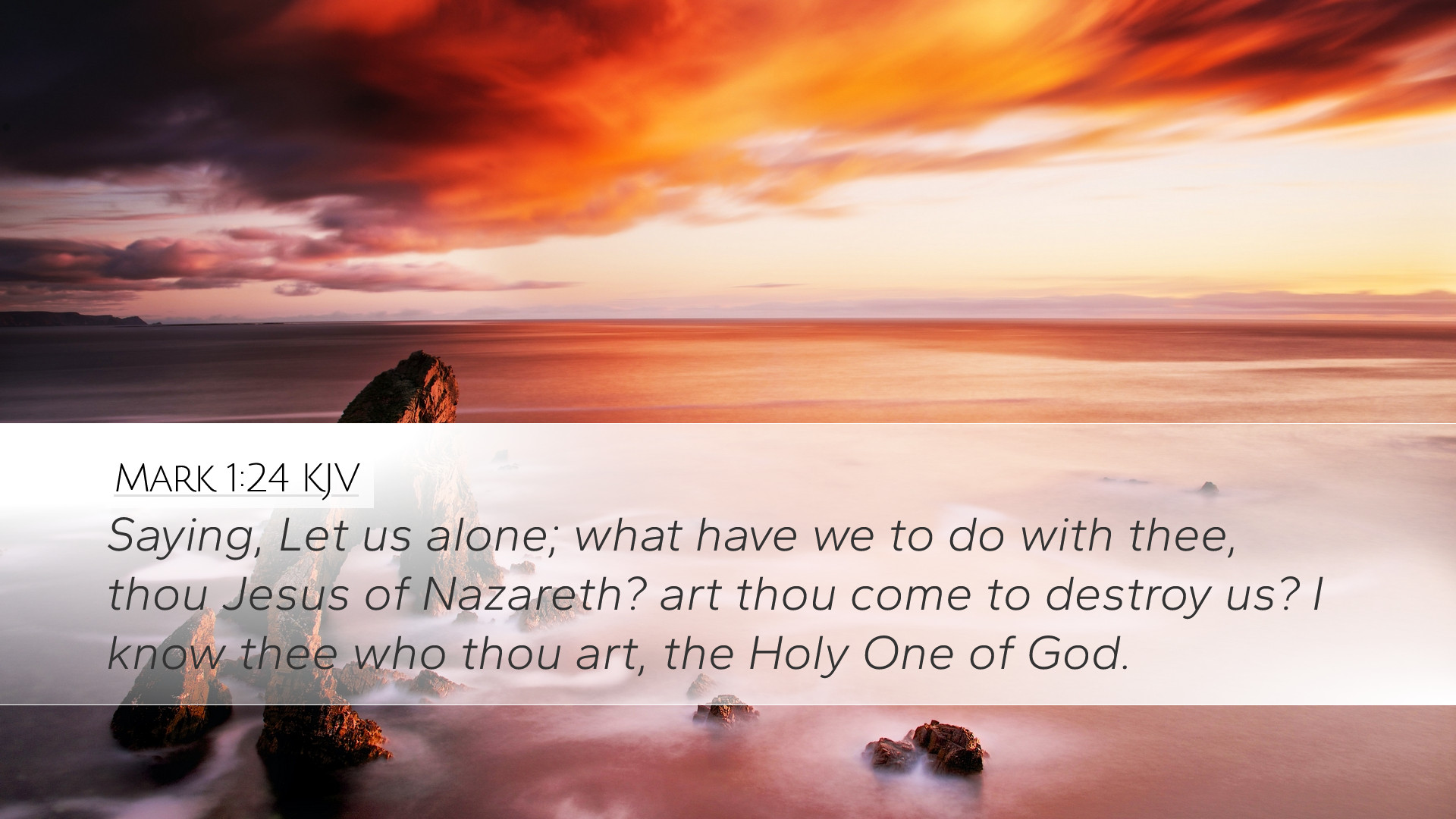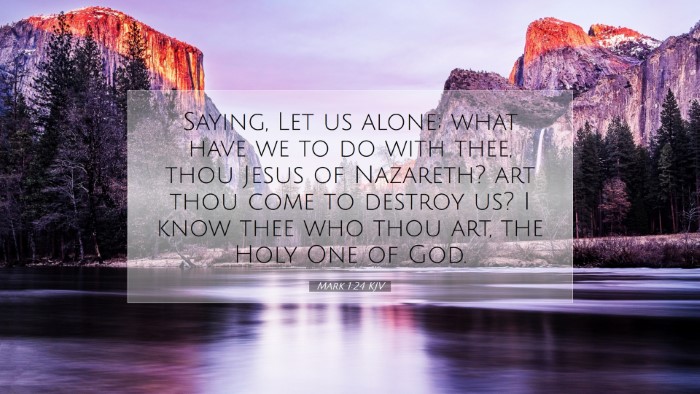Commentary on Mark 1:24
Verse Context: Mark 1:24 states: "What have you to do with us, Jesus of Nazareth? Have you come to destroy us? I know who you are—the Holy One of God."
This verse comes during an early episode in Jesus' ministry while he was teaching in the synagogues of Capernaum. It highlights the confrontation between Jesus and an unclean spirit, illustrating the authority Jesus possessed over spiritual realms and the recognition of His divine identity.
Insights from Public Domain Commentaries
Commentary by Matthew Henry
Matthew Henry emphasizes the dramatic encounter between Jesus and the unclean spirit as emblematic of the conflict between good and evil. He notes that the demonic acknowledgment of Jesus' identity serves to illustrate:
- The Authority of Christ: The unclean spirit recognizes Jesus as the "Holy One of God," which serves as an affirmation of Christ’s divine nature and mission.
- Spiritual Warfare: This passage illustrates the ongoing spiritual battle faced by believers; the presence of evil acknowledges the presence of divine holiness.
- The Power of Jesus’ Name: The spirits tremble at His name; recognizing Jesus signifies a confrontation of their existence and authority.
Henry suggests that the question posed by the spirit reflects common human fears regarding the coming judgment associated with the presence of divine power. The acknowledgment of Jesus as the "Holy One of God" establishes a critical foundation for understanding Jesus’ authority over both the physical and spiritual realms.
Commentary by Albert Barnes
Albert Barnes provides a detailed commentary focusing on the terms used by the unclean spirit. He notes that the phrase "What have you to do with us?" is a rhetorical question, implying a confrontation:
- Recognition of Authority: The spirit’s acknowledgment indicates that Jesus' ministry and presence alter the status quo; where Jesus is, darkness cannot remain.
- Fear of Judgment: The question reflects an understanding among demonic forces of their impending judgment and doom.
- Christ’s Identity: The title "Holy One of God" indicates a powerful affirmation of Jesus’ messianic role; the spirit’s understanding is unparalleled among the people at this early stage in Jesus’ ministry.
Barnes further points out that the spirit immediately recognizes its adversarial position and seeks to distance itself from the mission of Jesus, which indicates the spiritual implications of Jesus' arrival.
Commentary by Adam Clarke
Adam Clarke interprets this verse with a focus on the personification of evil. He indicates that the unclean spirit's words capture the common sentiments of those who oppose God's authority:
- Confrontation with Evil: Clarke highlights that the evil spirit exhibits knowledge about Jesus' identity, showcasing how the spiritual realm acknowledges Jesus’ supremacy.
- Dread of Christ's Power: The evil spirit feels threatened by Jesus, reflecting a common theme in scripture where darkness recoils from light.
- Theological Implications: It provokes the thought that evil knows its limitations; the recognition of Jesus by the spirit serves to affirm His authority and puts forth a challenge to humanity to recognize the same.
Clarke also reflects on the significance of this confrontation, noting how it parallels the spiritual struggles believers might face. The recognition by the unclean spirit serves as a reminder of the omnipotence of Christ, essential to the understanding of spiritual dynamics within the Christian faith.
Theological Reflections
This passage prompts deep theological reflection on several key areas:
- The Nature of Christ: The acknowledgment of Jesus as the "Holy One" encapsulates the Christian confession of Christ's divinity and holiness.
- Understanding Spiritual Warfare: The recognition of evil spirits in the presence of Christ invites believers to consider their own spiritual battles and the need for reliance on Jesus’ authority.
- The Urgency of Evangelism: Jesus' ministry begins with a confrontation that ultimately leads to liberation; believers are thus reminded of the power of the Gospel to transform lives.
Application for Ministry and Study
For pastors, students, and theologians, Mark 1:24 serves as a potent reminder of the authority of Christ that extends beyond mere human understanding into the spiritual realm. The implications for ministry may include:
- Encouragement in Spiritual Leadership: Understanding that Jesus has ultimate authority can provide reassurance and courage in spiritual leadership and ministry contexts.
- Teaching Spiritual Truths: This narrative invites deeper teaching on Christ's identity and the reality of spiritual opposition faced by believers.
- Promoting Evangelistic Outreach: The urgency reflected by the spirits' acknowledgment should inspire intensified efforts in sharing the Gospel.
Conclusion
Mark 1:24 stands as a powerful testament to the identity and authority of Jesus Christ. The dramatic encounter between Jesus and the unclean spirit provides rich insights into the nature of spiritual conflict and the significance of recognizing Jesus as the "Holy One of God." Through the perspectives of esteemed biblical commentators, we glean profound truths applicable to the Christian life, ministry, and scholarly study.


